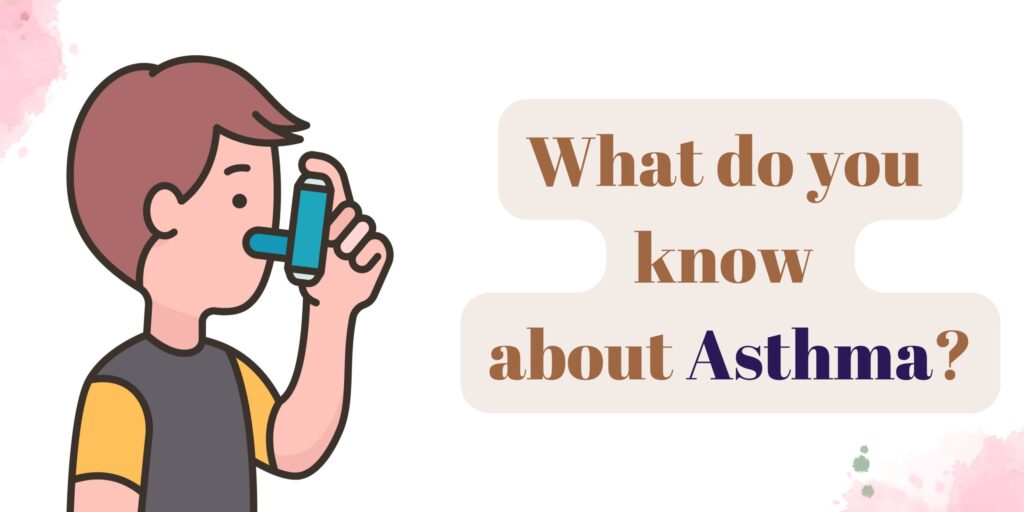Causes of asthma
The causes of asthma, along with symptoms and treatment, are discussed in detail in this article. Asthma is a disorder characterised by constricted and swollen airways that may create excess mucus. This can make breathing difficult and cause wheezing, coughing, and shortness of breath.
For some, asthma is a mild inconvenience. For some, it can be a severe concern that disrupts regular activities and can lead to a potentially fatal asthma attack.
Although asthma cannot be cured, its symptoms can be managed. Because asthma frequently varies over time, it is essential that you and your doctor monitor your symptoms and adapt your therapy as necessary.
Asthma symptoms differ from individual to individual. You may experience infrequent asthma episodes, symptoms only at specific times — such as during exercise — or constant symptoms.
Signs and symptoms of asthma include:
- Insufficiency of breath.
- Chest discomfort or tightness.
- Wheezing when exhaling is a typical symptom of asthma in children.
- Sleep disturbances brought on by shortness of breath, wheezing, or coughing.
Attacks of wheezing or coughing are exacerbated by a respiratory virus, such as a cold or influenza.
Asthma attack
When you breathe frequently, the muscles surrounding your airways relax, allowing for the unobstructed flow of air. During an asthma attack, three potential outcomes are possible:
- Bronchospasm: It is a contraction of the airway-surrounding muscles. Your airways get more compressed due to their constriction. When airways get constricted, air cannot flow freely through them.
- Inflammation: It causes the lining of your airways to expand, making it difficult to breathe. Inflamed airways restrict the amount of air that may enter or escape the lungs.
- The manufacture of mucus: During an attack, your body will create significantly more mucus than usual. This thick mucous makes breathing difficult.
Allergies are one of the causes of asthma. If you have allergies, you are more likely to have asthma. When your airways get constricted, you generate a sound known as wheezing when you breathe, which is a sound your airways make when you exhale. An asthma episode may also be referred to as an exacerbation or a flare-up. It is the word used to describe uncontrolled asthma.
Types and causes of asthma
Asthma is classified according to the degree and severity of symptoms. Healthcare professionals define asthma as Intermittent and Persistent.
Intermittent asthma appears and goes, allowing you to feel fine between attacks. Persistent asthma is characterised by frequent symptoms. Symptoms can range from minor to severe degrees. Healthcare providers determine the severity of asthma based on the frequency of symptoms. They also evaluate your ability to perform tasks during an attack.
Environmental factors are included in the causes of asthma. People can get asthma after being exposed to irritants in the airways. This includes allergies, vapours, poisons, and second or third-hand smoke. These are particularly dangerous for newborns and young children whose immune systems are still maturing.
Some respiratory infections, like respiratory syncytial virus (RSV), can harm the functions of developing lungs of young children. Asthma has various causes, like allergic and non-allergic.
Allergic: Some individuals’ allergies can trigger an asthma attack. Allergens include things like pollens, moulds, and pet dander.
Non-allergic: External influences can trigger asthma attacks. Exercise, illness, stress, and weather can all trigger an asthma attack.
Symptoms and treatments
Asthmatics typically exhibit apparent symptoms. These symptoms match those of other respiratory infections:
- Tightness, pressure, or discomfort in the chest.
- Coughing during the night.
- Insufficiency of breath.
- Wheezing.
You may not experience all of these symptoms with every asthma attack. Chronic asthma can cause fluctuating symptoms and indications at different times. Symptoms can also vary across asthma bouts.
Genetics is one of the causes of asthma. If asthma or allergy disorders run in your family, you have a greater chance of having the condition.
If your doctor diagnoses you with asthma, you will need to determine what causes an episode. By avoiding the triggers, you can prevent an assault. However, you cannot prevent yourself from developing asthma.
You could always live a highly fruitful life and engage in sports and similar activities even if you have asthma. Your healthcare professional can assist you in managing symptoms, identifying triggers, and preventing or treating attacks.



